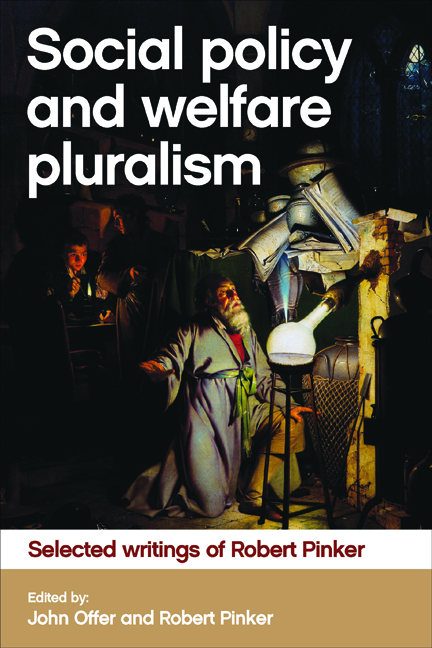Book contents
- Frontmatter
- Contents
- Acknowledgement
- Preface
- General introduction: Robert Pinker on rethinking approaches to welfare
- Introduction to Part One On social policy studies
- one The ends and means of social policy: a personal and generational perspective
- two Social theory and social policy: a challenging relationship
- three Stigma and social welfare
- four The welfare state: a comparative perspective
- five Richard Titmuss and the making of British social policy studies after the Second World War: a reappraisal
- Introduction to Part Two On social care, communities and the conditions for well-being
- six Report of the Working Party on the Role and Tasks of Social Workers: an alternative view
- seven The quest for community: from the Settlement Movement to the Griffiths Report: an historical perspective
- eight Citizenship, civil war and welfare: the making of modern Ireland
- Introduction to Part Three On welfare pluralism
- nine Golden Ages and welfare alchemists
- ten From gift relationships to quasi-markets: an odyssey along the policy paths of altruism and egoism
- eleven The experience of citizenship: a generational perspective
- twelve The right to welfare
- thirteen The prospects for social policy in the UK after the 2015 General Election
- Afterword On the post-Brexit prospects for social policy in the UK
- References
- Index
five - Richard Titmuss and the making of British social policy studies after the Second World War: a reappraisal
Published online by Cambridge University Press: 08 April 2022
- Frontmatter
- Contents
- Acknowledgement
- Preface
- General introduction: Robert Pinker on rethinking approaches to welfare
- Introduction to Part One On social policy studies
- one The ends and means of social policy: a personal and generational perspective
- two Social theory and social policy: a challenging relationship
- three Stigma and social welfare
- four The welfare state: a comparative perspective
- five Richard Titmuss and the making of British social policy studies after the Second World War: a reappraisal
- Introduction to Part Two On social care, communities and the conditions for well-being
- six Report of the Working Party on the Role and Tasks of Social Workers: an alternative view
- seven The quest for community: from the Settlement Movement to the Griffiths Report: an historical perspective
- eight Citizenship, civil war and welfare: the making of modern Ireland
- Introduction to Part Three On welfare pluralism
- nine Golden Ages and welfare alchemists
- ten From gift relationships to quasi-markets: an odyssey along the policy paths of altruism and egoism
- eleven The experience of citizenship: a generational perspective
- twelve The right to welfare
- thirteen The prospects for social policy in the UK after the 2015 General Election
- Afterword On the post-Brexit prospects for social policy in the UK
- References
- Index
Summary
Fifteen years ago, I was fortunate enough to hear Professor Friedrich von Hayek deliver a public lecture at the London School of Economics (LSE). That evening, the Old Lecture Theatre was packed with students and faculty members. Hayek had served as a Professor at the School and the University of London from 1931 to 1950. He had been awarded a Nobel Prize for his contributions to Economic Science in 1974.
Fifteen years on, I still see him standing at the lectern, ninety years old, six foot tall, spare of build and straight as a ramrod. I cannot recall the exact topic on which he spoke but I have never forgotten his introduction. ‘This occasion’, he said, ‘is undoubtedly the first and last time that any of you will receive a lecture on economics from a former artillery officer of the Austro-Hungarian Empire’. And it probably was.
I draw this comparison only to make the point that occasions like this give us an opportunity to reaffirm the continuities of scholarship in our chosen fields of study. We gather together in a ceremonial laying on of hands across the years when our memories become the generational fingertips by which we keep in touch with each other. Some of our recollections will be recorded in biographies and history books. Others will disappear into what Shakespeare called ‘the dark backward and abysm of time’.
I happen to be still young enough to have missed the First World War by a very generous margin of time. Nevertheless – in addition to having heard Hayek – I am still old enough to have taken morning coffee with Lord Beveridge and known most of the leading scholars – including Professor Tom Marshall – who were trailblazers and pioneers in the making of British social policy studies from the mid-1950s onwards. My one-time professor and teacher, Richard Morris Titmuss, was in the front rank of that vanguard.
The early years
I will start by saying something about Titmuss, the man, the place and time in which he worked as an academic, and the changing political and social background against which his thoughts about the ends and means of social policy developed to maturity.
- Type
- Chapter
- Information
- Social Policy and Welfare PluralismSelected Writings of Robert Pinker, pp. 93 - 112Publisher: Bristol University PressPrint publication year: 2017



